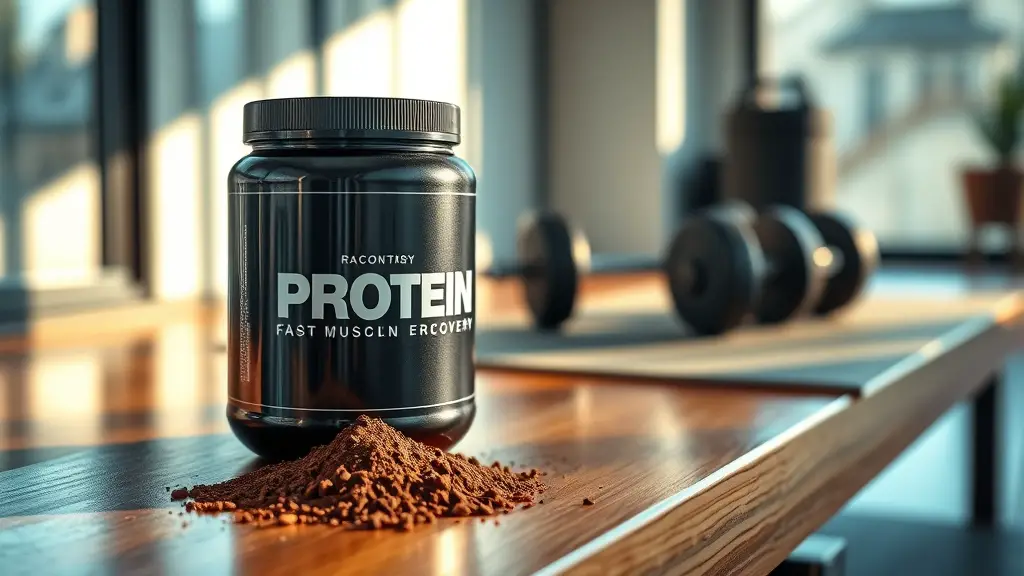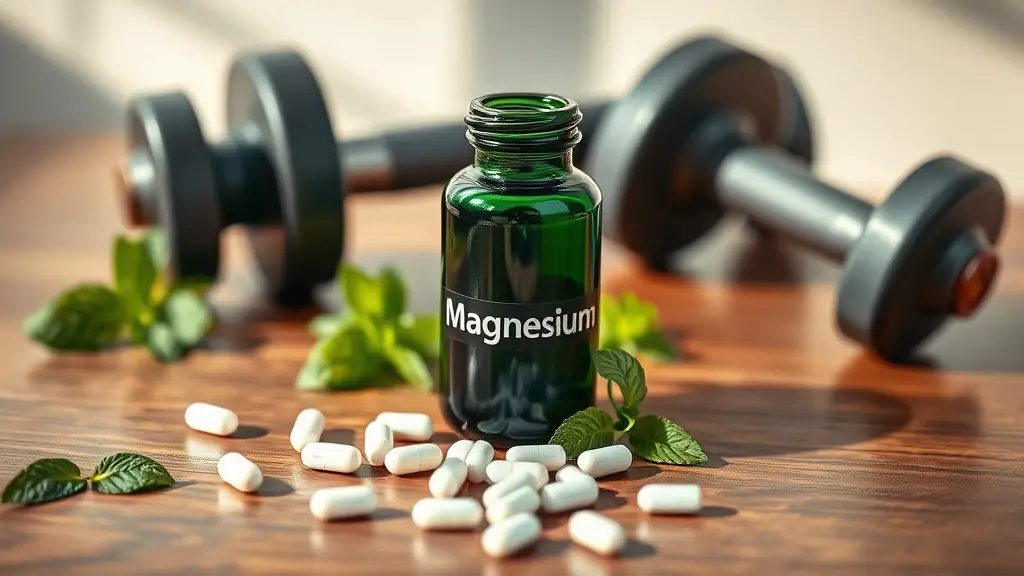The Best Supplements for Fast Muscle Recovery

To boost muscle recovery, you should consider key supplements. Protein, like whey and casein, helps repair muscles effectively. BCAAs can minimize soreness and enhance endurance, while creatine aids in reducing muscle damage post-exercise. Glutamine supports protein synthesis and immune health, and omega-3 fatty acids can lower inflammation. Don’t overlook magnesium, which improves sleep quality and muscle function. By incorporating these supplements, you’ll enhance your recovery process—keep going to discover more insights on optimizing your strategy.
Protein Supplements

Protein supplements play an essential role in muscle recovery, helping to repair and rebuild muscle fibers after intense workouts. Among the most popular options are whey protein and casein protein. Whey protein is a fast-digesting supplement, making it ideal for post-workout use. It quickly delivers amino acids to your muscles, promoting rapid recovery and muscle growth. Studies show that consuming whey protein after exercise can enhance protein synthesis, leading to improved strength and muscle mass.
On the other hand, casein protein digests slowly, providing a steady release of amino acids over several hours. This makes it a great option for nighttime recovery or as a meal replacement. Incorporating both whey and casein into your regimen can optimize recovery, ensuring your muscles get the nutrients they need when they need them. Remember, finding the right balance between these proteins can greatly impact your muscle recovery efforts.
Branched-Chain Amino Acids (BCAAs)
Branched-chain amino acids (BCAAs) can play an important role in your muscle recovery by reducing soreness and promoting muscle protein synthesis. To maximize their benefits, it’s essential to understand the best dosage and the best timing for consumption. Let’s explore how BCAAs can enhance your recovery routine effectively.
Benefits of BCAAs
When it comes to enhancing muscle recovery, BCAAs (Branched-Chain Amino Acids) offer significant benefits that can’t be overlooked. These essential amino acids—leucine, isoleucine, and valine—play an important role in muscle protein synthesis and reducing muscle soreness post-exercise. Research shows that BCAAs can improve muscle endurance, allowing you to push harder during workouts and recover faster afterward. By decreasing muscle breakdown and promoting recovery, BCAAs help you bounce back from intense training sessions more efficiently. Additionally, they can help minimize fatigue, keeping you energized and focused. Incorporating BCAAs into your regimen can be an effective strategy for achieving your fitness goals and maintaining peak performance during workouts.
Optimal Dosage Guidelines
To maximize the benefits of BCAAs, it’s essential to understand the ideal dosage guidelines. Research suggests that a daily intake of 5 to 20 grams can be effective for muscle recovery. Here’s a quick reference for dosage recommendations based on your activity level:
| Activity Level | Dosage Recommendation |
|---|---|
| Sedentary | 5 grams |
| Light Exercise | 10 grams |
| Moderate Exercise | 15 grams |
| Intense Training | 20 grams |
| Bodybuilding | 20 grams |
Timing’s also important; consuming BCAAs before or after workouts can enhance recovery. Following these dosage recommendations will help you optimize your muscle recovery process effectively.
Timing for Consumption
Timing your consumption of BCAAs can greatly impact their effectiveness for muscle recovery. To maximize their benefits, consider these key timing strategies:
- Pre Workout Timing: Taking BCAAs 30 minutes before your workout may help reduce muscle breakdown and enhance endurance during exercise.
- Post Workout Timing: Consuming BCAAs immediately after your workout can expedite recovery, as they aid in muscle repair and protein synthesis during the critical recovery window.
- Intra Workout Timing: Sipping on BCAAs during your workout can maintain energy levels and minimize fatigue, promoting better overall performance.
Creatine
Although many associate creatine primarily with muscle gain, it plays an essential role in muscle recovery as well. Research indicates that creatine can help reduce muscle cell damage and inflammation following intense exercise, allowing you to bounce back quicker. One of the key creatine benefits is its ability to replenish ATP, the energy currency of your cells, which is vital during recovery.
For best results, a common creatine dosage is 3 to 5 grams per day. This can be taken post-workout to enhance recovery, though some prefer a loading phase of 20 grams divided throughout the day for the first week. It’s also important to stay well-hydrated while using creatine, as it draws water into your muscles. By incorporating creatine into your regimen, you’re not just supporting muscle growth but also enhancing your overall recovery process.
Glutamine

While creatine supports muscle recovery, glutamine is another powerful amino acid that can greatly aid in this process. Known for its role in protein synthesis and immune function, glutamine offers several key benefits for athletes and fitness enthusiasts:
- Enhanced Recovery: Glutamine helps reduce muscle soreness and can speed up recovery time after intense workouts.
- Immune Support: Intense training can compromise your immune system. Glutamine fortifies it, helping you stay healthy and training consistently.
- Gut Health: This amino acid supports the intestinal lining, promoting overall digestive health, which is essential for nutrient absorption.
For those looking to incorporate glutamine into their diet, common sources include beef, chicken, fish, dairy products, and plant-based options like beans and spinach. Including these glutamine sources in your meals can greatly contribute to your muscle recovery strategy.
Omega-3 Fatty Acids
Omega-3 fatty acids are essential nutrients that can greatly enhance muscle recovery after intense workouts. They’re known for reducing inflammation, which means less soreness and faster recovery time. Incorporating omega-3s into your diet can truly support your fitness goals.
| Omega-3 Benefits | Omega-3 Sources | Recommended Intake |
|---|---|---|
| Reduces inflammation | Fatty fish (salmon) | 250-500 mg/day |
| Supports joint health | Chia seeds | |
| Aids in muscle repair | Walnuts |
You’ll find omega-3 sources in both animal and plant-based foods. Fatty fish like salmon and mackerel are excellent options, while chia seeds and walnuts are great for vegetarians. By adding these foods to your meals, you can enjoy various omega-3 benefits that will help you recover faster and perform better in future workouts.
Magnesium

Magnesium plays an essential role in muscle recovery by helping reduce inflammation and promoting relaxation after intense workouts. You can find magnesium in various foods, such as leafy greens, nuts, and whole grains, or as a supplement. Ensuring you get enough magnesium can greatly enhance your recovery process.
Role in Muscle Recovery
When it comes to muscle recovery, magnesium plays an essential role in various biochemical processes that help repair and strengthen muscle tissues. This mineral’s benefits are important for effective recovery strategies, particularly in reducing muscle inflammation. Here’s how magnesium aids in your muscle recovery:
- Enhances Protein Synthesis: Magnesium supports the creation of proteins, which are necessary for muscle repair.
- Reduces Muscle Cramps: It helps prevent cramps and spasms, allowing for smoother recovery after intense workouts.
- Improves Sleep Quality: Better sleep supports muscle regeneration, and magnesium can promote relaxation, aiding recovery.
Incorporating magnesium into your routine can greatly enhance your recovery efforts, making it an invaluable asset for anyone serious about their fitness journey.
Sources of Magnesium
While many people may not realize it, there are numerous dietary sources of magnesium that can considerably contribute to muscle recovery. Dark leafy greens like spinach and kale are excellent magnesium sources, along with nuts and seeds such as almonds and pumpkin seeds. Whole grains, including brown rice and quinoa, are also rich in magnesium.
For ideal muscle recovery, dietary recommendations suggest including these foods in your daily meals. Additionally, legumes like black beans and chickpeas can further boost your magnesium intake. Incorporating a variety of these foods not only helps meet your magnesium needs but also supports overall health. Remember, balancing your diet is key to effective recovery and maintaining muscle function.
Frequently Asked Questions
How Long Does It Take for Supplements to Show Recovery Effects?
Imagine feeling the familiar burn in your muscles after a workout, yet knowing relief is on the way. Recovery timeframes vary, but most supplements start showing effects within 24 to 48 hours. This depends on factors like your body’s metabolism and the supplement’s absorption rate. When you choose the right ones, you can enhance your recovery process, feeling less soreness and more energy to tackle your next workout sooner than you think.
Can I Overdose on Muscle Recovery Supplements?
Yes, you can overdose on muscle recovery supplements. It’s essential to follow dosage guidelines provided on the label or by a healthcare professional to guarantee supplement safety. Taking more than the recommended amount can lead to adverse effects, such as gastrointestinal issues or more serious health concerns. Always consult a doctor before starting any new supplement regimen, especially if you’re considering higher doses to enhance recovery. Prioritize safety and informed choices for the best results.
Are There Any Side Effects From Recovery Supplements?
Yes, there can be side effects from recovery supplements. While many are beneficial, some may cause gastrointestinal issues, headaches, or allergic reactions, depending on your body’s response. It’s important to read labels and consult with a healthcare provider before starting any supplement to guarantee they’re right for you. Monitoring your body’s reactions can also help you avoid potential side effects and optimize your recovery process effectively.
Should I Take Supplements Before or After Workouts?
You might be surprised to learn that timing your supplements can make a big difference. Taking them before workouts can enhance performance, offering pre workout benefits like increased energy and focus. On the other hand, post workout timing is essential for recovery, promoting muscle repair and growth. It really depends on your goals; if you want immediate energy, go pre-workout, but if recovery’s your focus, consider post-workout supplements instead.
Can Vegan Diets Affect Supplement Effectiveness for Recovery?
Yes, vegan diets can affect supplement effectiveness for recovery. While vegan protein sources can provide essential amino acids, some may lack certain nutrients vital for peak recovery. Nutrient absorption might be lower due to the presence of anti-nutrients in plant foods. To enhance recovery, make sure you’re combining various protein sources and considering supplements like B12 or iron. This way, you’ll support your body’s recovery processes more effectively, regardless of your dietary choices.





